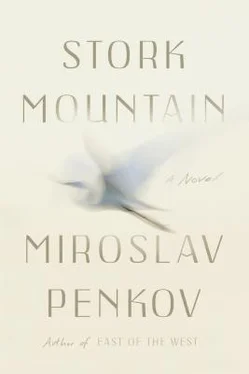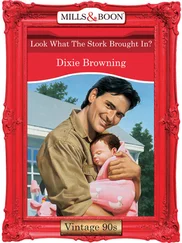Miroslav Penkov - Stork Mountain
Здесь есть возможность читать онлайн «Miroslav Penkov - Stork Mountain» весь текст электронной книги совершенно бесплатно (целиком полную версию без сокращений). В некоторых случаях можно слушать аудио, скачать через торрент в формате fb2 и присутствует краткое содержание. Год выпуска: 2016, Издательство: Farrar, Straus and Giroux, Жанр: Современная проза, на английском языке. Описание произведения, (предисловие) а так же отзывы посетителей доступны на портале библиотеки ЛибКат.
- Название:Stork Mountain
- Автор:
- Издательство:Farrar, Straus and Giroux
- Жанр:
- Год:2016
- ISBN:нет данных
- Рейтинг книги:4 / 5. Голосов: 1
-
Избранное:Добавить в избранное
- Отзывы:
-
Ваша оценка:
- 80
- 1
- 2
- 3
- 4
- 5
Stork Mountain: краткое содержание, описание и аннотация
Предлагаем к чтению аннотацию, описание, краткое содержание или предисловие (зависит от того, что написал сам автор книги «Stork Mountain»). Если вы не нашли необходимую информацию о книге — напишите в комментариях, мы постараемся отыскать её.
Stork Mountain — читать онлайн бесплатно полную книгу (весь текст) целиком
Ниже представлен текст книги, разбитый по страницам. Система сохранения места последней прочитанной страницы, позволяет с удобством читать онлайн бесплатно книгу «Stork Mountain», без необходимости каждый раз заново искать на чём Вы остановились. Поставьте закладку, и сможете в любой момент перейти на страницу, на которой закончили чтение.
Интервал:
Закладка:
Of course he knew the Party wouldn’t let him leave Klisura. Of course, in the daytime, Lenio herself refused to go elsewhere. She said the mountain held her in its fist. Saint Kosta held her. But late at night, in dreams, they traveled freely, away from parties, mountains, saints.
The baby was born when May was rolling to an end. They named him Kostadin. Then Grandpa had to leave. “You are the vekilin now,” the mayor told him. “You have a ritual to oversee. Pack up. We’re going to the Greeks.”
And so they went. Captain Vangelis met them in his yard, wined them, dined them. Not once did he approach Grandpa with talk of his stolen daughter. Not once did Lenio’s brothers give him a vile look. Even Michalis, whom Lenio had been supposed to wed, spoke to Grandpa with the respect his caretaking role demanded. On parting, once the dance was over, the local women kissed his hands.
Is it really this easy? Grandpa wondered. Is all forgiven? All forgotten?
Alas, it was not.
THREE
I HAD DOZED OFF on the terrace, wrapped in my blanket, as I often did. Saint Kosta lay at my feet and when he stirred I woke up. A mandolin was twanging below us, deep in the bowels of the house.
Soon Grandpa emerged from the old classroom, the Cremona in his hands. Without a word, he laid it on the table, replaced the strings with the ones I’d bought him in Burgas, and set about tuning them by ear.
November. Winter in the Strandja. The days were short; the nights were dark and lonely. A new, sharp kind of gust was polishing the snow into an icy crust. It swept the roads, the hills, it beat the blades of the unmoving turbines. It no longer bothered me that no one was switching them on. Nothing bothered me these days.
Each morning we rose with the sun, and while Grandpa boiled tea I cleaned Saint Kosta’s corner. He lived with us, inside the house, a skinny, sickly thing we feared wouldn’t see the spring. Not only had his wing healed crooked, but somehow he’d developed a pitiful limp in his leg. We were all pitiful. If Grandpa said let’s eat, we ate. If he said let’s walk, we walked. We visited Baba Mina and Dyado Dacho; we stopped by the café. But if Grandpa said nothing, if he took the chair beside me, I too kept quiet in my chair. If he didn’t eat, I didn’t eat. If he didn’t walk, I didn’t walk.
This apathy seemed like a decent bargain: I didn’t suffer. Nor was I merry.
“No,” Grandpa said sometimes. “Laugh. Cry. But do something. That’s life. Yours isn’t.”
“Yet here I am,” I’d say, and he would tell me: “My boy, you’re anywhere but here.”
I guess I was. I really couldn’t tell. Ever since Elif had run away, I’d lost my sense of position, both in time and in space.
“I look at you,” Grandpa would say, “and see myself. I can’t stand what I’m seeing. And this stork, watching me, judging me. It’s too much to take!”
So one night he brought out the old mandolin. His fingers grew more assured with each new day, but I never made a comment. November passed. December came. I sat as quiet as a man can sit. And then, one evening on the terrace Grandpa spoke.
“By the end, the mayor couldn’t stand me. He hated my guts. But what could he do? I was the Party. The priest was the Party. So the mayor did as we told him and let us carry out what we were sent to do.”
Two years after Grandpa and Father Dionysus first set foot in Klisura, the Party started changing all Muslim names. In the end, it was not a campaign that succeeded, but they’d try again a few decades later. I knew how the priest had been baptizing people left and right. But Grandpa had kept his own involvement a secret. As a teacher, he made sure the children of Klisura learned their А, Б, В . He taught them they were Bulgarians, not Turks. That’s why the Party had sent him and the Pope there — to get things ready for what much later they’d call the Process of Rebirth.
It had all started with Grandpa, still a teacher in Pleven. He liked to tell his students stories. Of his days as a partisan fighter. Of how he’d hid in a dugout and how, dizzy with hunger, he’d raided the sheep pens, the dairy farms with his comrades. But word got around and the principal called him to his office. “The regional governor has heard of your stories. He doesn’t like them.”
“What’s not to like?” Grandpa asked him.
“What, what! You can’t be telling our children the partisans were thieving food.”
“But we were thieving,” Grandpa said, laughing. “You were thieving, the regional governor was thieving.”
“Sure we were. But that’s not the point. The point is the regional wants to set an example.”
“All right,” Grandpa said. “I’ll talk to him myself.”
A huge office. A secretary. Freshly lacquered paneling on the walls. A massive desk. Behind the desk — Grandpa’s cousin, the regional governor.
“Listen, cousin,” Grandpa told him. “What’s this talk I hear, you want to punish me?”
“You’re dirtying the Party’s name,” the regional said. “We’re cousins and people are watching. I can’t be giving you preferential treatment. I need to maintain a clean face.”
So Grandpa told him, “You weren’t worried for your face in the dugout. And when that boy with the kalushari fell with a dagger in his chest, it wasn’t for your face you worried.”
The regional turned as pale as fresh cheese. “Leave!” he shouted. “Out of my office!”
The next day, the principal summoned Grandpa again. “Pack your bags. You’re leaving for Klisura.”
“And if I don’t?”
“Then Belene. The work camp.”
Well, devil take it. Grandpa didn’t want to end up food for pigs in a work camp. With great shame he consented. He would indoctrinate the Muslims in that distant village if that’s what the Party demanded.
All this I’d heard from the imam already. But it was different to hear it from my grandfather.
“They’d forced the priest too, by the way,” he said. “Let’s make that clear. God rest his bones, he was a decent man. God rest the mayor’s too.”
One morning, they found the mayor in his office. He’d shot himself in the heart with a pistol from before the Balkan War. Right by the boxes with new passports, which had just arrived from town. He’d written them a note. I leave this pistol to the teacher. I leave my soul to the priest. He can claim it when he comes to Hell. The teacher can have the pistol now .
“You want to see it?” Grandpa said.
I kept still, very quiet. Saint Kosta stretched at my feet and followed Grandpa with his gray eyes. Soon the old man returned from his room, a yellowish bundle in hand.
He laid the bundle gently before us and the other bundle, the black one, up in the stork nest, returned to me as if from a great distance. For the first time in many days, I felt a sting.
Here was the ancient pistol. It had belonged to Captain Kosta once. A braid of hair, thick as rope, black as tar, entwined its barrel like a serpent.
There was no need to ask whose hair this was.
FOUR
AND SO, TWO YEARS AFTER Grandpa had stolen Lenio from the Greeks, the Greeks were coming back to dance across the fire. As caretaker of the nestinari , Grandpa was bound to meet them in Klisura. But Lenio was not.
“You and the baby,” Grandpa told her the day little Kostadin turned one, “will stay in Burgas for a week. We’ll rent a room in a hotel. I’ll take you there and when the dancing here is over I’ll come to get you.”
For a long time Lenio said nothing. She rocked the baby on her knee; she kissed his forehead again and again. So Grandpa went on talking until at last he knew he’d failed. No matter how much he begged her, she wouldn’t leave Klisura.
Читать дальшеИнтервал:
Закладка:
Похожие книги на «Stork Mountain»
Представляем Вашему вниманию похожие книги на «Stork Mountain» списком для выбора. Мы отобрали схожую по названию и смыслу литературу в надежде предоставить читателям больше вариантов отыскать новые, интересные, ещё непрочитанные произведения.
Обсуждение, отзывы о книге «Stork Mountain» и просто собственные мнения читателей. Оставьте ваши комментарии, напишите, что Вы думаете о произведении, его смысле или главных героях. Укажите что конкретно понравилось, а что нет, и почему Вы так считаете.











